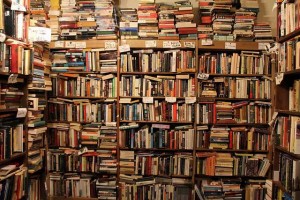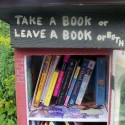 Should I write or should I read a book?
Should I write or should I read a book?
When I am short on time it’s easy to read a few pages on the bus, in the waiting room, or even in the bath. The number of pages accumulate quickly even though I only have time to read books in short bursts on most days.
This is also true for writing. I grab every opportunity to write long-hand in my composition notebook. Red lights in traffic while listening to the car radio. Cup of Piccolo Mondo coffee between appointments in Ithaca. Waiting to get the oil changed at Diane’s Downtown Automotive. Mulling over breakfast at the State Street Diner. I seize ten minutes and write.
My best reading is done on weekends and over holidays and vacations when I can spend uninterrupted time with a book in my hands. Summer is the best and August an orgy of reading.
Yet I map writing onto every stretch of my unscheduled time. Do you book your marathon writing sessions in sync with school calendars or around the religious or federal holidays? I’m headed to Two Harbors next week for a writing retreat along the shores of Lake Superior.
When I think about doing the work of an author, I often feel like I should be writing and deny my reading pleasures. Don’t you?
“If you don’t have time to read, you don’t have time the time (or the tools) to write. Simple as that,” Stephen King wrote in his memoir, On Writing.
Reading is critical to development as a writer. When things get busy for me, I won’t let reading books be the thing that gets squeezed out of my schedule.
Reading is the gateway to good writing. A poem, an essay, a powerful first chapter in a new book: the best writing prompts. Engaging with text inspires. It’s the solution to writer’s block. Read until you are ready to write.
Right. It’s not an either-or question of my time. Eleanor Catton, author of Booker Prize winning novel Luminaries, recently established a grant program for writers to take 3 months to read.
“My idea is that if a writer is awarded a grant, they will be given the money with no strings attached except that after three months they will be expected to write a short piece of non-fiction about their reading (what was interesting to them, what they learned) that will be posted online so that others can benefit from their reading too,” Catton said.
Good writers read good writing. They study the craft as much as enjoy the story. Francine Prose has written the authoritative guide on how to learn writing in Reading Like a Writer: A Guide for People Who Love Books and For Those Who Want to Write Them.
The best writers are avid readers.
There’s a lesson in that. Especially for writers who want to publish a book.
 If you want to be an author, behave more like a reader.
If you want to be an author, behave more like a reader.
A reader has needs, expectations, wishes, and desires they bring to a new book. What are yours? Make a list of what you want from books in your subgenre and subject area. There. You have the beginnings of a product description for what your book should offer. Read the classics and contemporary books in your subgenre and subject area. You need to know what your reader already knows.
Participate in reading groups. Listen to other readers discuss books and it will help you keep in perspective what readers care about most. Even better if you can find a book club which reads specifically in your subject area or genre to develop a keener sense of the reading public. Getting to know readers and making real connections over books will do more to build your audience platform than you can imagine now. Knowing readers better can only improve your writing.
Look at other authors’ websites and study their social media presence and like, follow, subscribe, connect and comment. Do this before you want others to like, follow, subscribe, connect or comment as an author. Do it so you can appreciate what it means.
Read new releases. Write reviews of the books you read on Amazon and GoodReads. Write your favorite authors a letter of appreciation.
If you want to be an author, you must first do for other authors what you hope readers will one day do for you. Pay it forward. Be a reader.
That means when you read someone’s writing and are touched by it, reach out and let them know. Tell your friends about the good books you’re reading. Read what they recommend. Show up at book signings, lectures, and reading. Look and learn.
There are advantages to behaving like a reader.
If you build a community of like-minded readers on Goodreads when it’s time to convert your account from reader to author, you have a solid platform behind you who become your best advertisers.
Likewise, if you’ve reviewed books on Amazon you can familiarize yourself with their features. As you read and review more books there you will find it easy to begin a comparative title analysis for your own book proposal. There is an economic war at play between Amazon and the publishing industry and it behooves you to learn more about it.
Once your book is published it appears on Amazon. Period. Open for reviews. And when your book is published the status of your account changes to author. You get access to your own page which your publisher may or may not encourage you to manage; they don’t. I recommend you do. Too many people use Amazon as a search engine and you can provide visitors with your calendar of events, social media links, and more. As an author you gain access to your sales data and marketing leads. Your publisher will want you to provide buy buttons on your website and in social media promotions that link directly to their site. But you can help direct traffic flow from Amazon’s author page to yours.
As a reader who connects with authors you admire, there is the possibility you can open doors with kind words. Writers are human and they enjoy engaging with intelligent readers who appreciate their contributions. This is how you can build a network for future potential endorsements of your work. More importantly, build your network based on gratitude for good writing.
Keep in mind some basic civic rules of readers who love writers online today.
- If you don’t have something good to say, you might best keep it to yourself or restrict yourself to face to face communications. [I learned this the hard way in my novice critique of Cheryl Strayed in her memoir Wild. I wrote how hard it was for me to relate to her as a heroin addict who left her husband after her mother in Minnesota died leaving behind a geriatric horse. Well, she blocked me on Twitter. Ooops. Learn from my mistake.]
- Superlatives and hyperbole and exclamation marks flag you as an amateur. Gravitas in the book world. [CAPS signify you think I’m deaf and stupid. Use style.]
- Before you point out a weakness, identify a strength to someone else’s writing. [Writers need to know what works as much as they need to know what didn’t.]
- Don’t use someone else’s site as an opportunity for shameless self-promotion.
- Well written constructive criticism is taken very seriously and feedback is appreciated by readers and writers.
- It’s one thing to be a fan and another to be a stalker. The internet and social media levels the playing field so that readers and writers can meet and engage directly online. I can participate in the celebration of the birthday of Amy Tan’s dog and her photos of her trip with her husband through Europe as my Facebook friend, but I’m not pestering her to read my manuscript. Yet. It takes time to learn the social etiquette and privacy settings and it’s best to learn them first as a reader before you publish and your life goes public.
- Shop in bookstores and talk to booksellers. Act like a reader. Walk in and ask for the kind of book you are writing. See where it leads you.
- Visit your public library and see what their collection holds. Where would your book fit on the shelves? Recommend books you think others will find valuable in your subgenre and subject area.
- Find a Little Free Library near you. Donate books See what readers take.
- Read outside your comfort zone. Try something new. Take a book from your Little Free Library.

Should I write or should I read? Yes. Both.

Okay. I wrote my first review today. i am going to love doing this, I keep telling myself. but I know I’m going to prefer reading the book. but because of this I will never read a book in the same way. and I’m going to push myself to interact more with authors. So thanks for the inspiration. Cheers.
Reading IS fun! May you be inspired by what you read to write.
Thank you. I always learn something new from your posts, and as a newly published author I have quite a bit to learn. It is one thing to be invited to the party. It is another thing to know how to act.
Kim
Thanks, Kim, for taking the time to read. And it is a party!